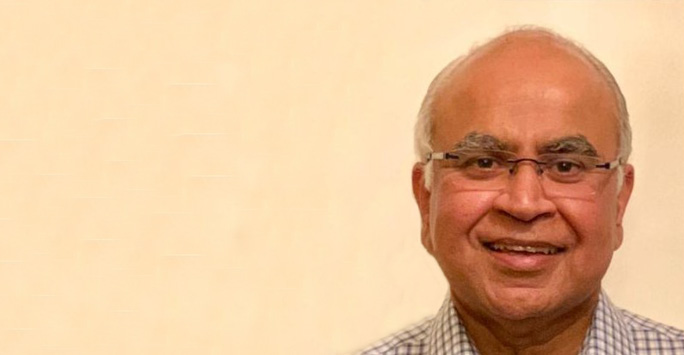
Staff profile: Dr George Ampat
One month into his new role as School Lead for Equality, Diversity and Inclusion (EDI), Dr George Ampat looks forward to the year ahead and to finding new ways of contributing to a happy learning environment.
Dr Ampat is a Consultant Orthopaedic Surgeon at Royal Liverpool University Hospital and has been teaching at Liverpool School of Medicine for 2 years. Once a spinal surgeon, he has since moved over to diagnostics and is a strong advocate for non-surgical approaches to treating musculoskeletal conditions.
He role models the lifestyle he encourages his patients to adopt and keeps himself fit and healthy. “Often patients who complain of a bad back for example will refrain from exercise, but that isn't the solution. It’s like air pressure in your car tyres, you need to be working and strengthening the muscles in order for them to give you the proper support, you can neither over nor under work them.”
Dr Ampat is thoroughly enjoying his time at the School and speaks glowingly about students and staff. Stepping into the new role of EDI Lead, what are his hopes in this area?
In simple terms, he defines the objective of equality, diversion and inclusion as finding ways to live happily together. In the medical profession this can apply to many areas, large and small, from systematic changes to interpersonal behaviours.
If you think about how clinicians may question students for example. How these questions are posed, and these interactions take place can result in sort of micro aggressions.
"A certain tone or way of phrasing can make them feel belittled, especially in a group setting. It's all about being aware of how you are addressing others and how mindful you are of how your own behaviours may be interpreted."
He is hopeful that we can shine a spotlight on unconscious bias, an area he feels passionate about. It's something he has experienced during his own career, noting how he has at times been treated differently and not always been given the same voice as others. He has also observed how the same unconscious behaviour can impact others.
"If you take a group setting, for example, a black doctor may ask a question, but the patient replies to the white doctor, or a doctor who is a woman makes a point and the patient responds to another doctor who is a man."
You can feel completely ignored.
But he is confident that the vast majority of these instances come down to people not realising what they are doing and is excited about plans for training opportunities to support all of us in identifying and rectifying biases and related behaviours. "No learning can occur where there is any mistrust or angst," he reflects, and removing this is the goal behind any and all efforts in equality, diversity and inclusion.
George is encouraged by the interest shown by students to be an active part of the solution to such issues. He looks forward to working with societies on their actions in response to the new student charter they have created. Equally, he looks forward to working with faculty colleagues on key aspects for the School, such as changes to the curriculum.
He is especially delighted that all placement Trusts and Health Education England have come together with the School to work on training to address placement ‘microaggression’ and its reporting.
George has also begun weekly surgeries, every Monday evening, to connect with students and, first and foremost, provide a space to share. "I'm delighted that students are coming along and connecting."
Weekly surgeries start up again after the Christmas break and students are invited to drop in any time. Join Mondays 17:30 – 18:30 over Zoom.